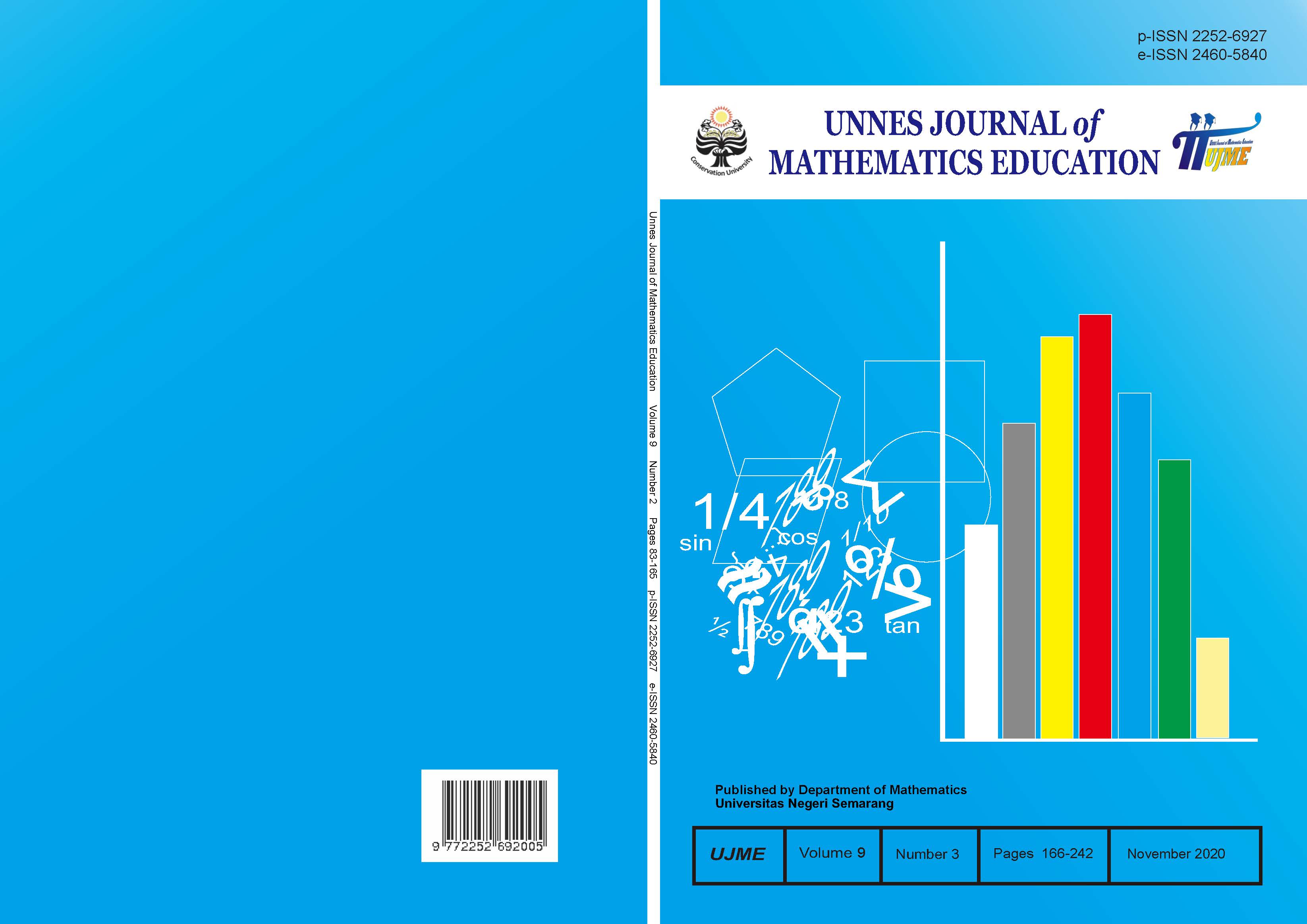Mathematical reasoning ability of students based on learning style using Missouri Mathematics Project learning model
##plugins.themes.academic_pro.article.main##
Abstract
The purpose of this study is to (1) determine whether student learning outcomes in aspects of mathematical reasoning ability using the Missouri Mathematics Project learning model achieve classical completeness criteria, (2) describe the mathematical reasoning ability in terms of learning styles using the Missouri Mathematics Project learning model. The method used is mixed methods explanatory sequential design with a population of students in one of senior high school in Demak in the academic year 2019/2020. Samples were taken by cluster random sampling and obtained XI Mathematics dan Science 4 as an experimental class. The research subjects were taken with a purposive sampling technique selected based on the learning style category and obtained 6 subjects. The research data was taken by using test, questionnaire, and interview techniques. The results showed (1) The ability of mathematical reasoning on the application of the Missouri Mathematics Project learning model achieved classical completeness; (2) Two types of visual learning style subjects have mathematical reasoning abilities at the medium and low levels; (3) Two types of auditory learning style subjects have mathematical reasoning abilities at high and low levels; (4) Two types of kinesthetic learning style subjects have mathematical reasoning abilities at high and low levels; (5) The average results of the ability tests for each learning style show that students with auditory learning styles have the highest average.
##plugins.themes.academic_pro.article.details##
References
Arikunto, S. (2013). Prosedur Penelitian Suatu Pendekatan Praktik. Jakarta : Rineka Cipta.
Creswell, J. (2015). Riset Pendidikan: Perencanaan, Pelaksanaan, dan Evaluasi Riset Kualitatif Kuantitatif. Diterjemahkan oleh Soetjipto, H. P. & Soetjipto, S. M. (2015). Yogyakarta: Pustaka Pelajar.
Hendriana, H., Rohaeti, E.E., dan Sumarmo, U. (2017). Hard Skills dan Soft Skills Matematik Siswa. Bandung: Refika Aditama.
Irnistisia, F., Kusmayadi, T. A., Riyadi (2016). Eksperimentasi Model Problem Based Learning ( PBL ) dan Model Pembelajaran Missouri Mathematics Project ( MMP ) Ditinjau dari Sikap Siswa terhadap Matematka pada Materi Persamaan dan Pertidaksamaan Linear Satu Variabel Kelas VII SMP Negeri Se-Kabupaten Be. JMEE, VI(I), 68–78.
Kartini, B.S.R, Walid, & Rahayu, I. (2019). Meningkatkan Kemampuan Berpikir Kritisdan Sikap Percaya Diri Siswa Kelas XI Mipa 3 SMA Negeri 4 Semarang melalui Penerapan Model PBL Berbantuan Permainan Isometri. PRISMA, Prosiding Seminar Nasional Matematika 2, 836-840
Nu'man, M. (2012). Penanaman Karakter Penalaran Matematis Dalam Pembelajaran Matematika Melalui Pola Pikir Induktif- Deduktif, JURNAL FOURIER, 1(2), 53–62.
Permendikbud Nomor 23 Tahun 2016 tentang Standar Penilaian Pendidikan.
Permendikbud No. 36 Tahun 2018 tentang Kurikulum 2013 Sekolah Menengah Atas / Madrasah Aliyah.
Rahmawati, F. & Sugiman. (2015). Komparasi Kemampuan Penalaran Peserta didik Kelas VIII antara Model Pembelajaran Think Talk Write (TTW) dan Two Stay-Two Stray (TS-TS). Seminar Nasional Matematika 2015. Yogyakarta : Universitas Negeri Yogyakarta.
Rivai, M.A. & Surya, E. (2017). Analisis Model Pembelajaran Missouri Mathematics Project Terhadap Kemampuan Penalaran Matematika Siswa SMP.
Savitri, S. N., Rochmad, R., & Agoestanto, A. (2013). Keefektifan Pembelajaran Matematika Mengacu Pada Missouri Mathematics Project Terhadap Kemampuan Pemecahan Masalah. Unnes Journal of Mathematics Education, 2(3).
Wibowo, A. (2017). Pengaruh Pendekatan Pembelajaran Matematika Realistik dan Saintifik terhadap Prestasi Belajar, Kemampuan Penalaran Matematis dan Minat belajar. Jurnal Riset Pendidikan Matematika, 4(1), 1-10.
Yusdiana, B. I., & Hidayat, W. (2018). Analisis Kemampuan Penalaran Matematis Siswa SMA pada Materi Limit Fungsi. JPMI (Jurnal Pembelajaran Matematika Inovatif), 1(3), 409-414.
